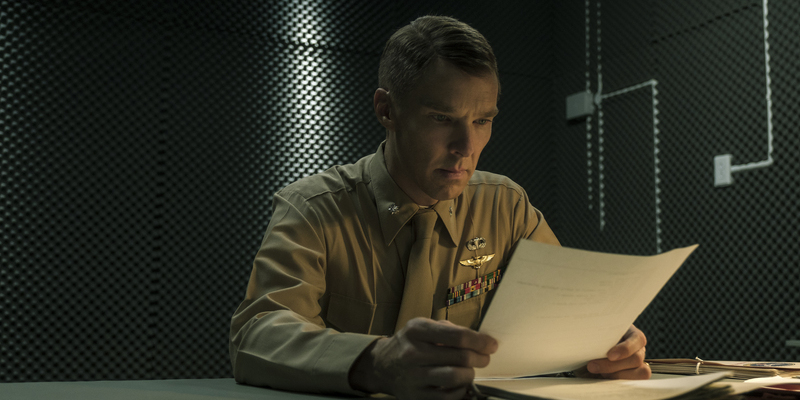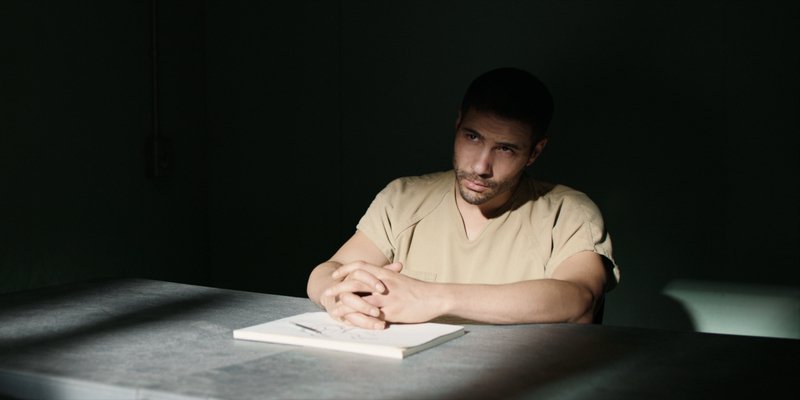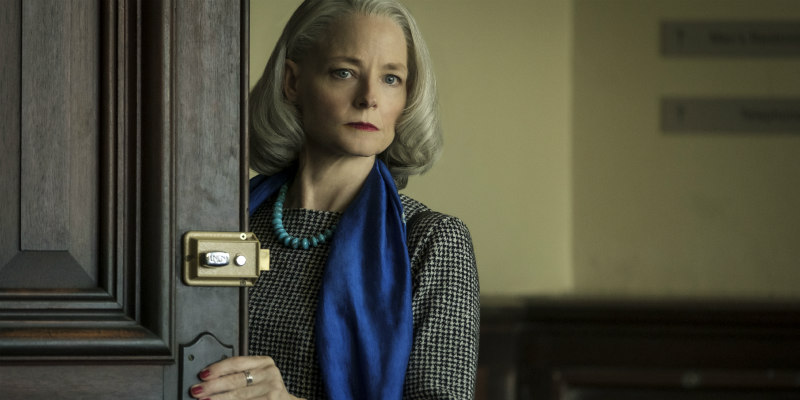
Review by
Ren Zelen
Directed by: Kevin Macdonald
Starring: Tahar Rahim, Jodie Foster, Benedict Cumberbatch, Shailene Woodley,
Zachary Levi

True stories are the most difficult films to review, particularly those
such as The Mauritanian, dealing with real people caught in the net of forces more powerful than
themselves, objects of the wrath of a nation seeking retribution, with a
government keen to find scapegoats and not too concerned with how they
find them.
Recent political events in the western world have torn the curtain from
our institutions to reveal how quickly they can sink into corruption and
how eagerly they throw the blame for their own misdeeds onto a convenient
target, without offering any proof. The Mauritanian is a
timely reminder of how ‘civilized’, democratic nations can sink into
barbarity when their own security is threatened.
The film is a legal drama directed by Kevin Macdonald from a
screenplay written by M.B. Traven, Rory Haines and
Sohrab Noshirvani. It is based on the 2015 memoir ‘Guantánamo
Diary’ by Mohamedou Ould Salahi, a man who was detained and
imprisoned on Guantánamo by the U.S. government for 14 years without
charges.

The action begins with the U.S. reeling from the attacks of 9/11 and
determined to catch the perpetrators of the outrage. The Mauritanian of
the title, Mohamedou Ould Salahi (Tahar Rahim), is whisked away
during a family event in his home for questioning by the police, and then
simply disappears, leaving behind loved ones desperate to find out what
happened to him.
The Bush and Cheney administration is under pressure to find those
connected to al Qaeda. They come across evidence which they decide is
enough to accuse Salahi of being a recruiter for Bin Laden. There are two
events which they feel link Salahi to al Qaeda - one of the hijackers
spent a night on Salahi’s couch in Germany, and he once received a call
from his cousin on Bin Laden’s phone. However, Salahi has his own
explanations for these occurrences.
After several years, an attorney by the name of Nancy Hollander (a steely
Jodie Foster) takes up his cause, starting with a simple habeas
corpus case, wherein the U.S government must charge Salahi or let him go.
She recruits an associate named Teri (Shailene Woodley) to assist
her.
The military prosecutor is Lt. Colonel Stuart Couch (Benedict Cumberbatch), who was close friends with one of the pilots murdered by the
terrorists on that day, and he is keen to bring the architects of the
crimes to justice, seeking no less than the death penalty. Couch is
determined to see justice done and cannot comprehend why Hollander would
want to see Salahi set free due to lack of due lawful process for his
imprisonment.
Much of The Mauritanian specifies the stages of Salahi’s
interrogation while imprisoned in Guantánamo. Although fluent in French
and German, as well as in his native language, he is so long imprisoned
among the American military that he has time to learn English before
visited by Hollander and Teri.
His grasp of English means he can interact with his captors and is
eventually on first name terms with the American soldiers and CIA
interrogators.

When years of regular interrogations fail to make Salahi change his
explanation and confess to the crimes they are accusing him of, the
military take over from the CIA. They have been given permission to use
whatever means they see fit to get a confession.
So begins Salahi’s descent into hell - shackled in a stress position in a
freezing cell with death metal music blaring out at high volume for hours
and days on end. Sleep deprived, waterboarded, beaten and humiliated by
masked guards and sexually assaulted and insulted by a masked female
soldier. It makes for painful viewing.
It transpires that both Hollander for the defense and Couch for the
prosecution find it impossible to get to the bottom of Salahi’s case for
imprisonment. The countless files concerning his years of interrogations
have been misdated, ‘summarised’, redacted, or are simply ‘classified’ and
impossible to get hold of by either side. Both Hollander and Couch begin
to suspect that the U.S. military may in fact be holding men in the Cuban
prison without proof and denying them the right of a legal trial.
The situation becomes increasingly obfuscated by red tape and confusing as
Hollander and Teri find what appears to be a ‘confession’. However, by
this stage even Couch begins to doubt the government’s narrative. Thus,
it’s up to Hollander and her legal team to mount a challenge.
Both Foster and Cumberbatch as Hollander and Couch give sterling
performances, Cumberbatch adding depth to an honourable character who is
appalled to discover the extent of his country’s crimes.
But the emotional core of the film is French-Algerian actor Rahim,
(excellent in his leading role in 2009’s A Prophet). Rahim’s nuanced and compelling performance succeeds in engaging our
sympathies with his character while we still remain unsure of his
blamelessness.

The U.S was traumatised by the attack on their own soil, one that was
unforeseen and incomprehensible to most of the public. The government at
the time felt compelled to prevent any further attacks coming from an
enemy they knew so little about. To fulfil this aim, they abandoned their
own principles.
As we now know, Guantánamo Bay operated outside the law. People could be
held without charge for years, tortured into confessing under duress to
something that they may not have done. The federal courts have often since
ruled that people were held there unlawfully, Salahi’s case being one of
the most high-profile and disturbing.
The rest of the world should not feel complacent, as most nations are not
blameless regarding their own instances of horrific moral compromises. It
remains reassuring that the US is still a country which offers the freedom
to publish a book and make a film openly revealing one of the darkest
periods in its recent history, and that at least, is to be commended.

The Mauritanian is on Amazon Prime
Video UK/ROI from April 1st.

